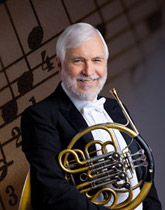
With his father at his side, the young boy listens to the musicians tuning their instruments. The ornate hall holds a sold-out crowd, mostly of well-dressed adults. The rustling of sheet music and the occasional clearing of throats all cease when the oboe sounds its first notes. It’s the moment when the music begins. The Chattanooga Symphony Orchestra plays, and Dale Clevenger is captivated. He is seven years old.
Clevenger returns to the symphony and to the opera, again and again, with his father, a sawmill manufacturer by day, who served a term as the President of the Chattanooga Opera Association. Whenever possible, the young boy sits as close to the musicians as possible just to watch them. His eyes gravitate toward one instrument in particular. A French horn is shiny like all the other brass, but he’s particularly intrigued by the instrument’s distinct look—a frame that twists inward on itself; the long tubing, which permits various pitches, looping round and round before finally culminating in a grand bell.
Clevenger has never heard a solo for what he simply calls, “the horn.” He has no real sense of its sound. All he knows is that he likes it. But a seven or eight year old boy doesn’t walk into a store and buy a horn. Much too expensive. At last, though, at eleven years old, he gets the chance to be a part of the school band. Just one problem: the horn isn’t an option for his family. It’s almost three times as expensive as the trumpet, which he gets instead.
He plays the trumpet in the school band for two years until, one day, his bandleader tells him that the school needs a horn player, and they’ve located an instrument he can borrow. Clevenger doesn’t have to be asked twice. From then on, the horn practically becomes an extension of the boy. As a seventh and eighth grader, he is skilled enough to play in both the junior high school band and the high school band. He also begins to play in the Chattanooga Youth Symphony and at the Cadek Conservatory. Before too long, Clevenger finds himself sitting in the spot that he once focused on with rapt attention as a young boy. He auditioned with the Chattanooga Symphony Orchestra and was given the role of fourth horn. He is just 17.
The orchestra’s third horn, an adult musician, befriends him and becomes his mentor. She introduces him to dozens of “great” orchestral recordings and also to Forrest Standley, a Carnegie Mellon professor and principal horn for the Pittsburgh Symphony Orchestra. During the summer, Standley performs in upstate New York with other members of the Pittsburgh orchestra. He asks Clevenger if he would like to join them. Once again, he doesn’t have to be asked twice. In New York, he is not only thrust alongside professional musicians, he is also given lessons from Standley. Once he returns to high school, there is no doubt where he wants to go to college. He only applies to Carnegie Mellon, not even considering that he might not be accepted. He was.
In addition to perfecting his musical talent at Carnegie Mellon where, majoring in horn, he earns his BFA in 1962, Clevenger was given some valuable advice on the mindset needed to be a success: “My teacher would say, ‘If you can’t be a horn player, be the best shoe salesman you can be.’”
Good advice, because prospects for young musicians can be daunting. Clevenger sees peers audition as many as 30 times without securing a position. “I didn’t know until I got out of college how I would actually do in auditions,” he says frankly.
He moves to New York and takes every audition he can, including one in the living room of revered conductor, Leopold Stokowski. “I had chutzpah,” he says. The auditions land him chairs with Stokowski’s American Symphony Orchestra and the Symphony of the Air directed by Alfred Wallenstein. Soon after, he attains the position of principal horn of the Kansas City Philharmonic.
Then, at the age of 26, he auditions with one of the world’s most renowned orchestras, the Chicago Symphony. Once again, it goes very well. He is granted the position of principal horn. It’s a position he hasn’t left in 45 years. He has become one of the longest standing principal horns in any orchestra around the world. Along the way, there have been plenty of highlights, including:
- Three Grammy awards
- Conductor and/or soloist with numerous orchestras worldwide
- John Williams’ Concerto for Horn and Orchestra written for—and premiered by—Clevenger
- 2010 Lifetime Achievement Award from the International Horn Society
- 2011 Distinguished Alumni Award from his alma mater
With a career of such impressive accomplishments, he says there are too many memorable experiences to mention. But a colleague remembers one. Eugene Izotov, principal oboe for the Chicago Symphony, recalls one night not too long ago when the symphony was performing Das Lied von der Erde (The Song of the Earth) by Gustav Mahler. Izotov bumped into Clevenger backstage during intermission. The two began discussing the performance. “I saw there were tears forming in his eyes,” says Izotov. Clevenger explained to the oboist that this was Mahler’s farewell to the world, one of the last that he would write. “That’s Dale, music means so much to him,” says Izotov. Even after so many years.
Clevenger will be among those involved at the School of Music’s two Centennial Celebration concerts: March 31 in Pittsburgh; April 2 in New York City. Learn more: https://www.music.cmu.edu/
Michelle Bova (DC’07) of New York City, has been a regular contributor to this magazine since her senior year at Carnegie Mellon.
Related Links:
Horn Player Dale Clevenger: A Conversation with Bruce Duffle



